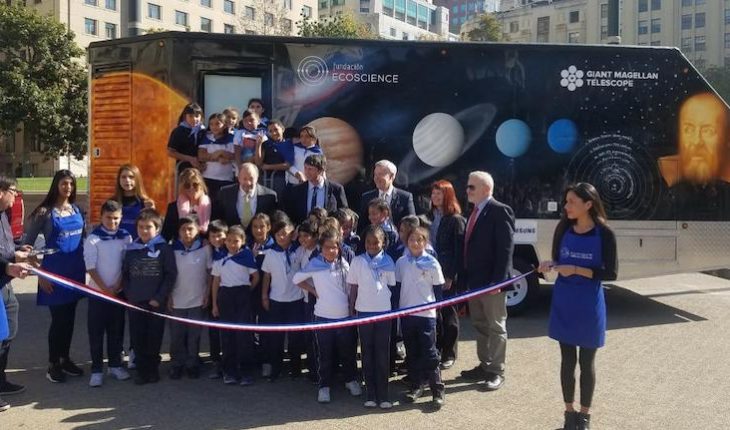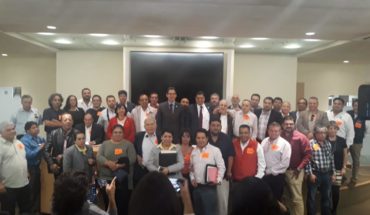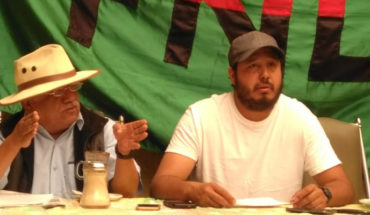With a civic party in the square of the Constitution, was launched on Monday May 13 the LabMóvil conscience Asthrone Mine and itinerant planetarium of the Ecoscience Foundation, the organization Telescope Magallanes Gigante (GMTO) and the Embassy of the United States in Chile.
The eclipses of 2019 and 2020 will be the hallmark of this laboratory that will reach the most secluded and vulnerable places in the national territory.
Enthusiasm for developing knowledge
Who inaugurated this initiative was the Minister of Science, Technology, knowledge and innovation, Andrés Couve, who stressed the importance of this project: “The Eclipse season that begins on July 2, and also the fact that we are building the largest Telescopic terrestrial capacity in Chile, puts us in a privileged position where we must use that opportunity for science to be constituted in a development engine of the country. For this goal we need scientists, scientifics, investigators, researchers, but we also need that enthusiasm for developing knowledge to reach our children and our girls. ”
After the ribbon cut of this launch, Minister Couve also pointed out that “initiatives like this mobile astronomy laboratory serve to make science reach children throughout our territory, excited with scientific research, and that we can To contribute to the formation of citizens interested in science, not just scientists. In this sense, this public-private partnership is a great opportunity to do so.
Eduardo Ergas, president of the Ecoscience Foundation, together with the Minister of Science, Technology, knowledge and innovation, Andrés Couve, during the launch of LabMóvil Awareness astronomy.
The total eclipses of Sun of 2019 and 2020, as well as the inclusion through astronomy, will be central axes of the innovative educational proposal of the LabMóvil conscience astronomy, which will have as final aim to bring the astronomy to the places more secluded and Vulnerable in our country.
According to the president of the Ecoscience Foundation, Eduardo Ergas, the LabMóviles conscience are giving new opportunities to the children of Chile through scientific education. “With the Bus conscience and the LabMóvil Magallanes consciousness we have already impacted more than 40000 students from Visviri to Puerto Williams. With the LabMóvil astronomy awareness we hope to go even further. ”
It is expected that only in 2019, the LabMóvil awareness astronomy reaches more than 3000 students from different regions, starting with the communes of Paine, Conchalí, Lampa and Til Til.
Inclusive Material
For the representative of the telescope Magallanes Gigante (GMTO), Miguel Roth, the LabMóvil awareness Astronomy will be an opportunity to test the best practices in science education. “An example is the matter inclusive” universe with all the senses “, which allows to teach astronomical concepts to blind people. The success of this material has been enormous, and we want to add more experiences like this that can be replicated at the national level. ”
The launch of this unique laboratory also included the presence of the Chargé of the U.S. Embassy, Baxter Hunt, and the President of the Council of Conicyt, Mariane Krause, among other government authorities, members of the scientific community, and Students of the school trails of Culitrín of Paine, and of the college Christopher Columbus of Conchalí, institutions that will be visited by the laboratory.
By an eclipse for all
The total eclipses of the sun, visible from Chile in 2019 and 2020, are a unique opportunity to bring astronomy to the inhabitants of the whole national territory.
The LabMóvil astronomy awareness will not only visit the North and south of Chile by promoting the safe observation of eclipses, but also help people with visual impairments to understand this astronomical phenomenon through the tactile book “Open your Senses to The Eclipses: South America “, developed by NASA and the University of Edimboro (Pennsylvania), in collaboration with GMTO. The LabMóvil will also feature an Arduino, a device specially developed to “listen” eclipses through a system sensitive to changes in luminosity.
The education program that will carry on the LabMóvil awareness Astronomy also include the successful traveling Backpack “universe with all Senses”, created by the planetarium of Medellín (Colombia) and the International Astronomical Union (IAU), to teach Astronomy to blind people or with reduced vision. One of the three original backpacks was donated to GMTO, an institution that took on the task of replicating this material in Chile at low cost. Today there are 7 itinerant backpacks in Chile, produced entirely in our country, which have managed to reach more than 100,000 people in different regions.
How the LabMóvil awareness Astronomy is born
The LabMóvil Awareness Astronomy is born from a donation of the Kavli Foundation and the Giant Magellan Telescope (GMTO) to the Ecoscience Foundation, for the development of an educational project capable of bringing the best practices in astronomy education to all Chile. This mobile laboratory is the third of the Ecoscience Foundation Fleet, which at the same time incorporates the awareness Bus and the LabMóvil Magallanes consciousness.
This ambitious project enthused an official of the U.S. Embassy in Chile, Geoff Andersen, who decided to deliver to indefinite loan his personal telescope that will tour Chile next to the lab.
Finally, the Embassy of the United States in Chile decided to donate a last generation mobile planetarium to this project, making it the most modern and equipped educational astronomy project in the country.
The partners of this adventure
The Ecoscience Foundation is born from the passion for science of its founder and president, Eduardo Ergas, who could see the potential of this in the development of the countries. Five years ago, Ecoscience created the conscience Bus, a mobile laboratory that promotes STEM education and research-based learning in rural and vulnerable schools in the country. His second mobile laboratory consisted of a project for the Magallanes region. The third, and most ambitious project, is the LabMóvil awareness Astronomy, developed in collaboration with the telescope Magallanes Gigante and The Kavli Foundation.
The Giant Magellan telescope hopes to become the first of the next generation of “extremely large telescopes”. When it initiates its scientific operations, in the middle of the next decade, the GMT will open a new era of discovery in fundamental areas of astrophysics, cosmology and the study of extrasolar planets. The GMT is being built in the Cerro Las Belles, on the boundary between the regions of Atacama and Coquimbo, and will have seven giant mirrors that form a primary mirror of 25 meters in diameter. The GMT resolution will be 10 times that of the Hubble Space Telescope, and its capacity to collect light will be 100 times greater.
The Embassy of the United States in Chile supports the educational proposal of the LabMóvil awareness astronomy through the donation of a planetarium of last generation and an inflatable dome that will travel through Chile together with mobile laboratory. Children and public of all ages who have never enjoyed a planetarium can have a unique experience thanks to this collaboration.
translated from Spanish: Traveling astronomy laboratory will travel to the most secluded and vulnerable places in Chile
May 14, 2019 |





